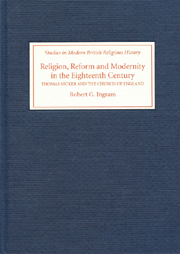Book contents
- Frontmatter
- Contents
- Dedication
- Preface
- Abbreviations
- 1 ‘Efforts at Amendment’
- 2 Becoming an Anglican
- 3 Becoming an Insider
- 4 The Church and the Enlightenment
- 5 The Church and the Parishioners
- 6 The Church and the State
- 7 The Church and America
- 8 The Church and Churches Abroad
- Epilogue
- Bibliography
- Index
- Previously published volumes in this series
2 - Becoming an Anglican
Published online by Cambridge University Press: 12 September 2012
- Frontmatter
- Contents
- Dedication
- Preface
- Abbreviations
- 1 ‘Efforts at Amendment’
- 2 Becoming an Anglican
- 3 Becoming an Insider
- 4 The Church and the Enlightenment
- 5 The Church and the Parishioners
- 6 The Church and the State
- 7 The Church and America
- 8 The Church and Churches Abroad
- Epilogue
- Bibliography
- Index
- Previously published volumes in this series
Summary
Thomas Secker might seem an unlikely Anglican church reformer, not least because he was not reared an Anglican. Instead, he was brought up a Presbyterian and at some point early on espoused Arianism. Why this heterodox nonconformist became an orthodox churchman bears explaining first. He certainly did not blaze new trails in his journey away from nonconformity: the depletion of their ranks, particularly of ministerial candidates like Secker, worried Dissenters during the early eighteenth century. Yet those Protestant nonconformists who conformed to the established Church rarely explained their confessional conversions, leaving hostile contemporaries to impute to them less than flattering motives. This was certainly true of Secker, and, indeed, the closer one gets to the sparse archival record of his early life, the more opaque become both the motive and chronology of his defection. Nonetheless his transit from Dissent to Anglicanism helps to explain some of the salient features of his orthodox reform vision. It also highlights the causes and consequences of the intellectual, political, and religious tumult that so defined the first part of the eighteenth century. For Thomas Secker became an Anglican during an age in which religious pluralism had only recently been legalized, in which religion factionalized the nation's politics, and in which heterodoxy bloomed. His mature religious views forged during this era, Secker took away from it the lesson that errant belief was always something to be confronted head on because if left unanswered, it could horribly contaminate the Church of England and could eat away at the ties which bound church and state together.
- Type
- Chapter
- Information
- Religion, Reform and Modernity in the Eighteenth CenturyThomas Secker and the Church of England, pp. 19 - 44Publisher: Boydell & BrewerPrint publication year: 2007



